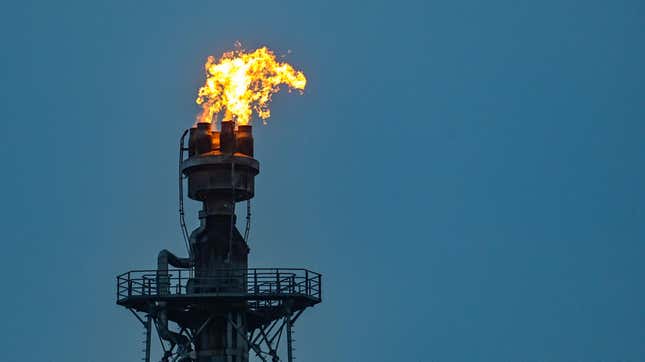
Big oil and gas companies under pressure to clean up their act on climate have a new “solution”: Ditching responsibility for polluting assets by selling them off to no-name companies.
An analysis from the Environmental Defense Fund released Tuesday highlights how oil giants like Shell, Exxon, and Chevron are offloading oil and gas assets to smaller entities, such as state-owned oil companies and private-equity backed firms, that have no oversight or reporting requirements to shareholders. These smaller companies are then able to jack up production or lag behind on cutting methane emissions.
“Once these assets are sold, years of [climate] progress are reset instantly,” Andrew Baxter, a director at EDF and one of the analysis’s coauthors, said on a press call Tuesday. “Once you multiply this across potentially hundreds of assets a year, year over year, this is a really scary phenomenon with negative environmental impacts.”
The analysis uses a combination of satellite data and industry filings on mergers and acquisitions to track changes in how emissions from specific sites may have changed after a sale. In tracking hundreds of deals between 2017 and 2021, researchers noticed some disturbing results.
Take Shell, Total, and Eni Energy—all publicly held companies with net-zero targets their investors have pressured them to fulfill. These three companies sold off their interests in an onshore oil mining field in Nigeria in 2021 to a private equity-backed operator. Shell in particular has outlined sales like these as a “key part” of its strategy to reach net zero, and it was the top seller of assets between 2017 and 2021 in EDF’s analysis.
But the problems for the planet got even bigger after these companies left. “As the keys were handed over, average flaring almost immediately quadrupled,” Baxter said.
Not only are smaller, opaque buyers of production sites like these not beholden to public scrutiny about methane leaks during their operations, but they usually will try to make more money from the sites they buy, pumping out more oil and gas than the previous owners did from the same asset. This can result in both more methane from venting and flaring as well as more fossil fuel eventually being produced from the site—meaning more emissions when that fuel is eventually used.
Sales like these are also a big problem for safely decommissioning oil and gas sites. The Apache Corporation, a publicly held American oil and gas firm, sold off more than 2,000 wells—including many inactive wells—in the Permian Basin in Texas to a small private equity-backed operator in July 2021. Apache, which has both public methane reduction commitments and discloses its emissions in annual reports to investors, had been making brisk work of plugging inactive wells in this field, closing more than 150 per year on average. But in the year since the deal, the site’s new owners have closed just two wells. This means that the unused wells could now lag for years, spewing methane and polluting the local environment.
“When we did this analysis, I kind of felt like a doctor finding the root cause for the disease of the orphan well problem that plagues the onshore oil and gas industry,” Baxter said. “It is so clear to me there are no safeguards around these transactions that prevent this problem from happening.”
Although many of these mergers and acquisitions involve publicly traded companies and household names in Big Oil, data around the deals and their resulting emissions and other environmental impacts “can be very tricky to find,” Gabriel Malek, a project manager at EDF and one of the analysis’s coauthors, said on the call. This is an enormous problem for banks, investors, and shareholders who may be looking to hold companies accountable.
The analysis that EDF performed is “a process that the average stakeholder would have trouble undertaking,” Malek said. “In addition to the climate problem, there’s a major disclosure problem that undermines accountability in this space.”
And once a production site is sold from a public company that keeps track of emissions for stakeholders, Baxter added, “it’s likely we will never see [emissions from that site] reported ever again.”
It’s crucial that these problems get addressed. Thanks to methane’s intensity over the short term and its worrying recent rise in our atmosphere, it’s imperative that we curb emissions from known sources—like the oil and gas industry—as soon as possible. Plugging methane emissions from oil and gas production is not only easy but is actually a financial plus for oil and gas companies. But as this report shows, it’s easy for the industry to talk a big game while not actually holding itself accountable—which has real-world implications. Earlier this year, the International Energy Agency found that methane emissions from the fossil fuel industry were a whopping 70% more than what official estimates show.
If publicly traded oil companies and banks that still support fossil fuels really want to position themselves as part of the climate solution, they can start by doing more due diligence when selling assets. The report points out that oil and gas companies are some of the most sophisticated dealmakers out there, and they routinely tie existing pipeline and infrastructure contracts and commitments to sales. Tying climate commitments and emissions reporting to sales, too, should be an easy first step. Regulators must also start tightening reporting requirements on all companies, so that oversight of emissions and climate commitments isn’t solely up to shareholders. And the hypocrisy of a company like Shell claiming that it’s reaching net zero fossil fuels by simply shifting off its assets to other producers shouldn’t be glossed over—and it should factor into larger public criticisms of what corporate “net zero” really means.
“The oil and gas industry can sell their oil and gas assets for whatever reason that they want, but they can’t sell their climate responsibility,” Baxter said.